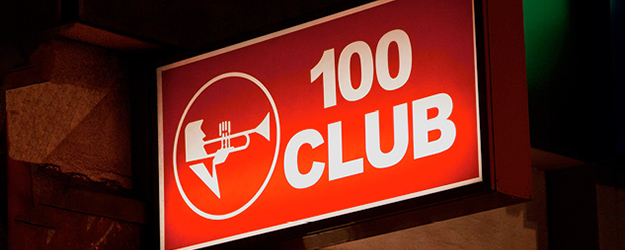This website uses cookies so that we can provide you with the best user experience possible. Cookie information is stored in your browser and performs functions such as recognising you when you return to our website and helping our team to understand which sections of the website you find most interesting and useful.
Business News Legal Live Business
Future of London’s 100 Club assured with 100% discount on business rates
By Andy Malt | Published on Thursday 30 January 2020

The 100 Club in central London has been granted special status by Westminster City Council giving it a 100% discount on its business rates bill.
It is the first time a music venue has benefitted from so called ‘localism relief’, part of a scheme that gives local authorities some flexibility over business rates for organisations that have a substantial positive impact on the local community. The move by the London local authority should protect the 100 Club’s future as a hub of live music in the capital.
In order to maintain this relief, the building has to meet certain criteria, including remaining a grassroots music venue and being run on a not for profit basis. The scheme is also open to any other music venue in the borough of Westminster that can meet the necessary conditions.
The venue’s owner Jeff Horton says in a statement: “I’m THRILLED the 100 Club has been granted this new business rates relief. It means we can continue to support the careers of the hundreds of artists who take to our stage each year. This is a game changing approach from a local authority in supporting grassroots music venues. I’m grateful to Westminster Council and for the continued support of the Mayor Of London and the Night Czar. I hope that other local authorities will adopt a similar forward-thinking approach to support the music industry”.
London’s there mentioned Night Czar Amy Lamé – who helped Westminster Council to develop its new music venue tax relief scheme – adds: “The 100 Club is an important part of London’s music history, providing a stage for up-and-coming and world-renowned acts for more than 75 years. Grassroots music venues play a key role in London’s thriving nightlife and that is why we’ve worked closely with The 100 Club and Westminster City Council to secure its future”.
“This is the first time that special status has been awarded to a grassroots music venue and it is a great example of what can be done to support venues in our city”, she goes on. “I urge other local authorities to work with us to support venues in their boroughs and help boost London’s vibrant nightlife”.
It’s now nearly ten years since the 100 Club announced that it was facing closure, after rent and business rates spiralled to a total bill of nearly £18,000 a month. Following a massive campaign to save it – including a performance at the venue by Paul McCartney – trainer brand Converse stepped in to ensure its doors stayed open. In 2012, an application was made for grade II listed status in order to provide further protection, but this was denied.
The news of the 100% tax relief for the 100 Club comes less than a week after it was announced that, from April, all small and medium music venues across the country will be able to claim a 50% discount on their business rates bills. The rebate has long been called for by campaigners, who say that high rates – which for some venues have more than doubled in recent years – are a key reason for more than a third of grassroots venues in the UK closing in the last decade. Rate relief schemes were already available for other small high street businesses, including pubs, but music venues had previously been excluded.
Among those leading the campaign on business rates relief for grassroots music venues have been the Music Venue Trust and the Musicians’ Union. Both welcomed yesterday’s announcement regarding the 100 Club.
MVT’s CEO Mark Davyd says: “Following on from the announcement earlier this week of the rate relief being offered by central government for grassroots music venues, this move by Westminster is simply fantastic for 100 Club, for London and for artists and audiences. Across our major cities, we have key, iconic grassroots music venues that we desperately need to find a way to keep. We congratulate Westminster Council on having found a path to do exactly that using localism relief”.
Still in campaigning mode, Davyd adds: “Other boroughs in London, in Liverpool, Manchester, Bristol, Brighton, Glasgow, Cardiff, now need to follow suit. Our city centres need to keep cultural destinations that drive activity and support the whole night-time economy, and we strongly urge local authorities across the country to look at the example here and consider how they can act”.
The MU’s National Organiser For Live Performance, Dave Webster, says: “We are delighted to learn that Westminster Council has taken the bold decision to cut business rates for the 100 Club. Keeping such a landmark venue open is crucial to London’s cultural landscape. Its iconic wall of fame will continue to grow as more bands play the venue this year and into the future. Let’s hope other councils across the UK take Westminster’s lead in protecting live music venues”.





